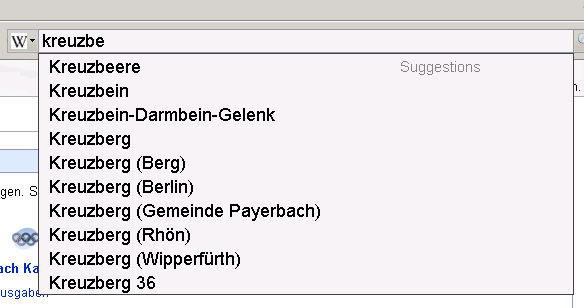|
Yahoo Search BOSS
Yahoo Search BOSS (Build your Own Search Service) was a Yahoo! Developer Network initiative to provide an open search web services platform. Yahoo discontinued BOSS JSON Search API, BOSS Placefinder API, BOSS Placespotter API and as well BOSS Hosted Search, on March 31, 2016. Yahoo BOSS is succeeded by Yahoo Partner Ads (YPA). History Yahoo launched BOSS in July 2008. In 2012, Yahoo expanded their Yahoo Search BOSS platform to provide additional services such as BOSS Hosted Search to enable any website owner to embed Yahoo web search experience free on their site. BOSS API The main goal and idea of BOSS was to give users, in its case developers, access to the Yahoo Search index for a small fee. The results could be supplied into the developer's website or program so that they could manipulate the resources according to their product's requirements. BOSS allowed the results to be returned in XML, JSON, HTML, or text and allowed use of comprehensive search features availab ... [...More Info...] [...Related Items...] OR: [Wikipedia] [Google] [Baidu] |
Yahoo! Developer Network
Yahoo! (, styled yahoo''!'' in its logo) is an American web services provider. It is headquartered in Sunnyvale, California and operated by the namesake company Yahoo Inc., which is 90% owned by investment funds managed by Apollo Global Management and 10% by Verizon Communications. It provides a web portal, search engine Yahoo Search, and related services, including My Yahoo!, Yahoo Mail, Yahoo News, Yahoo Finance, Yahoo Sports and its advertising platform, Yahoo! Native. Yahoo was established by Jerry Yang and David Filo in January 1994 and was one of the pioneers of the early Internet era in the 1990s. However, usage declined in the late 2000s as some services discontinued and it lost market share to Facebook and Google. History Founding In January 1994, Yang and Filo were electrical engineering graduate students at Stanford University, when they created a website named "Jerry and David's guide to the World Wide Web". The site was a human-edited web directory, ... [...More Info...] [...Related Items...] OR: [Wikipedia] [Google] [Baidu] |
Open Search
OpenSearch is a collection of technologies that allow the publishing of search results in a format suitable for syndication and aggregation. Introduced in 2005, it is a way for websites and search engines to publish search results in a standard and accessible format. OpenSearch was developed by Amazon.com subsidiary A9 and the first version, OpenSearch 1.0, was unveiled by Jeff Bezos at the ''O'Reilly Emerging Technology Conference'' on 15 March 2005. Draft versions of OpenSearch 1.1 were released during September and December 2005. The OpenSearch specification is licensed by A9 under the Creative Commons Attribution-ShareAlike 2.5 License. Support Web browsers that support OpenSearch include Safari, Microsoft Edge, Firefox and Google Chrome. Mozilla have indicated that they will deprecate OpenSearch search addons in favour of WebExtensions search addons. This will not affect the ability to manually add an opensearch engine from a website As of December 5, 2019, search e ... [...More Info...] [...Related Items...] OR: [Wikipedia] [Google] [Baidu] |
Yahoo Search
Yahoo! Search is a Yahoo! internet search provider that uses Microsoft's Bing search engine to power results, since 2009, apart from four years with Google until 2019. Originally, "Yahoo! Search" referred to a Yahoo!-provided interface that sent queries to a searchable index of pages supplemented with its directory of websites. The results were presented to the user under the Yahoo! brand. Originally, none of the actual web crawling and data housing was done by Yahoo! itself. In 2001, the searchable index was powered by Inktomi and later by Google until 2004, when Yahoo! Search became independent. On July 29, 2009, Microsoft and Yahoo! announced a deal in which Bing would henceforth power Yahoo! Search. As of July 2018, Microsoft Sites handled 24.2 percent of all search queries in the United States. During the same period of time, Oath (the then-owner of the Yahoo brand) had a search market share of 11.5 percent. Market leader Google generated 63.2 percent of all core search ... [...More Info...] [...Related Items...] OR: [Wikipedia] [Google] [Baidu] |
Index (search Engine)
Search engine indexing is the collecting, parsing, and storing of data to facilitate fast and accurate information retrieval. Index design incorporates interdisciplinary concepts from linguistics, cognitive psychology, mathematics, informatics, and computer science. An alternate name for the process, in the context of search engines designed to find web pages on the Internet, is ''web indexing''. Popular engines focus on the full-text indexing of online, natural language documents. Media types such as pictures, video, audio, and graphics are also searchable. Meta search engines reuse the indices of other services and do not store a local index whereas cache-based search engines permanently store the index along with the corpus. Unlike full-text indices, partial-text services restrict the depth indexed to reduce index size. Larger services typically perform indexing at a predetermined time interval due to the required time and processing costs, while agent-based search engines inde ... [...More Info...] [...Related Items...] OR: [Wikipedia] [Google] [Baidu] |
JSON
JSON (JavaScript Object Notation, pronounced ; also ) is an open standard file format and data interchange format that uses human-readable text to store and transmit data objects consisting of attribute–value pairs and arrays (or other serializable values). It is a common data format with diverse uses in electronic data interchange, including that of web applications with servers. JSON is a language-independent data format. It was derived from JavaScript, but many modern programming languages include code to generate and parse JSON-format data. JSON filenames use the extension .json. Any valid JSON file is a valid JavaScript (.js) file, even though it makes no changes to a web page on its own. Douglas Crockford originally specified the JSON format in the early 2000s. He and Chip Morningstar sent the first JSON message in April 2001. Naming and pronunciation The 2017 international standard (ECMA-404 and ISO/IEC 21778:2017) specifies "Pronounced , as in 'Jason and The ... [...More Info...] [...Related Items...] OR: [Wikipedia] [Google] [Baidu] |
HTML
The HyperText Markup Language or HTML is the standard markup language for documents designed to be displayed in a web browser. It can be assisted by technologies such as Cascading Style Sheets (CSS) and scripting languages such as JavaScript. Web browsers receive HTML documents from a web server or from local storage and render the documents into multimedia web pages. HTML describes the structure of a web page semantically and originally included cues for the appearance of the document. HTML elements are the building blocks of HTML pages. With HTML constructs, images and other objects such as interactive forms may be embedded into the rendered page. HTML provides a means to create structured documents by denoting structural semantics for text such as headings, paragraphs, lists, links, quotes, and other items. HTML elements are delineated by ''tags'', written using angle brackets. Tags such as and directly introduce content into the page. Other tags such as surround ... [...More Info...] [...Related Items...] OR: [Wikipedia] [Google] [Baidu] |
Google Custom Search
Google Programmable Search Engine (formerly known as Google Custom Search and Google Co-op) is a platform provided by Google that allows web developers to feature specialized information in web searches, refine and categorize queries and create customized search engines, based on Google Search. The service allows users to narrow the 11.5 billion Web indexing, indexed webpages down to a topical group of pages relevant to the creator's needs. Google launched the service on October 23, 2006. Services The Google Custom Search platform consists of three services: Custom Search Engine Released on October 23, 2006, Google Programmable Search allows anyone to create their own search engine by themselves. Search engines can be created to search for information on particular topics chosen by the creator. Google Programmable Search Engine allows creators to select what websites will be used to search for information which helps to eliminate any unwanted websites or information. Creators ... [...More Info...] [...Related Items...] OR: [Wikipedia] [Google] [Baidu] |
Yahoo! Search
Yahoo! Search is a Yahoo! internet search provider that uses Microsoft's Microsoft Bing, Bing search engine to power results, since 2009, apart from four years with Google Search, Google until 2019. Originally, "Yahoo! Search" referred to a Yahoo!-provided interface that sent Web search query, queries to a searchable index of pages supplemented with its directory of websites. The results were presented to the user under the Yahoo! brand. Originally, none of the actual Web crawler, web crawling and Data warehouse, data housing was done by Yahoo! itself. In 2001, the searchable index was powered by Inktomi (company), Inktomi and later by Google until 2004, when Yahoo! Search became independent. On July 29, 2009, Microsoft and Yahoo! announced a deal in which Bing would henceforth power Yahoo! Search. As of July 2018, Microsoft Sites handled 24.2 percent of all search queries in the United States. During the same period of time, Verizon Media, Oath (the then-owner of the Yahoo bran ... [...More Info...] [...Related Items...] OR: [Wikipedia] [Google] [Baidu] |
Software Developer Communities
Software is a set of computer programs and associated documentation and data. This is in contrast to hardware, from which the system is built and which actually performs the work. At the lowest programming level, executable code consists of machine language instructions supported by an individual processor—typically a central processing unit (CPU) or a graphics processing unit (GPU). Machine language consists of groups of binary values signifying processor instructions that change the state of the computer from its preceding state. For example, an instruction may change the value stored in a particular storage location in the computer—an effect that is not directly observable to the user. An instruction may also invoke one of many input or output operations, for example displaying some text on a computer screen; causing state changes which should be visible to the user. The processor executes the instructions in the order they are provided, unless it is instructed to ... [...More Info...] [...Related Items...] OR: [Wikipedia] [Google] [Baidu] |


